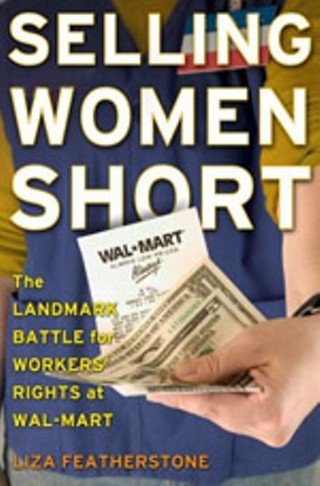Book Review: Readings
Liza Featherstone
Reviewed by Nora Ankrum, Fri., Nov. 12, 2004

Selling Women Short: The Landmark Battle for Workers' Rights at Wal-Mart
by Liza FeatherstoneBasic Books, 282 pp., $25
Economist Marc Bendick's finding that "women make up over 60 percent of Wal-Mart's hourly workers, but just 33 percent of management" is an oft-repeated statistic in news of the Betty Dukes v. Wal-Mart class action lawsuit. Given the behemoth size of both the suit (with its unprecedented class of 1.6 million women) and its defendant, the outcome's guaranteed to affect the entire retail industry. Considering the lawsuit has already drawn comparisons to Brown v. Board of Education, Bendick's underwhelming statistic, despite highlighting a significant disparity, does little to clarify all the hubbub, and that's where Liza Featherstone's Selling Women Short comes in.
Culled mostly from interviews with plaintiffs, witnesses, and lawyers, this book breathes life into the names and numbers likely to become familiar to us as the case plays out. Bendick's 33%, for instance, seems more damning when you consider that in 1999, the percentage of women in management at Wal-Mart "was less than that of its competitors in 1975." Featherstone's interviews corroborate that number with countless anecdotes of women being discouraged or outright sabotaged from moving ahead in the company. Wal-Mart claims women simply choose not to apply for promotions, yet it still can't account for the income gap between men and women in the same positions – often "despite women's superior performance evaluations" – nor does it explain why teenage boys have made more starting out than women who've been with the company for years.
While Featherstone seems overly enamored of plaintiffs' virtues, extolling in them a level of company devotion to which readers might have a hard time relating, her impressive research speaks for itself, as does her empathy for all of Wal-Mart's underpaid and underrepresented, male or female. She notes that employees are screwed equally when it comes to living wage – Wal-Mart actually supplements wages with paperwork on company letterhead detailing how to apply for food stamps and other forms of welfare. In fact, "each Wal-Mart store employing 200 people costs taxpayers $420,750 per year in public assistance." Overall, Featherstone makes a convincing case that Betty Dukes v. Wal-Mart affects not only women, but all employees, shoppers, and taxpayers alike.










